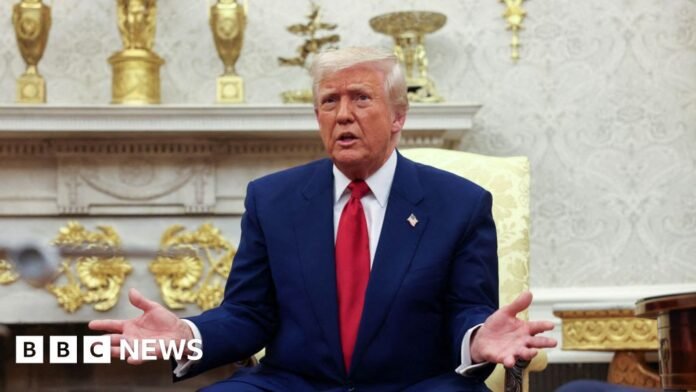Political leaders have a “job of work to do” to ensure US tariffs do not lead to unintended negative consequences for businesses, the head of Northern Ireland’s Chamber has said.
Suzanne Wylie said the tariffs announcement “delivered big changes which present a real and substantial test for Northern Ireland businesses”.
Speaking as the chamber publishes its quarterly survey, Ms Wylie said it was “calling on our governments to really make sure Northern Ireland is considered throughout all negotiations”.
Northern Ireland Secretary Hilary Benn confirmed on Tuesday that the UK government had carried out an impact assessment on how businesses in Northern Ireland might be affected.
He also said the government will take a “calm and considered approach” in dealing with the fall out from the US trade tariffs.
First Minister Michelle O’Neill warned that President Trump was playing a “dangerous game” and said she would make the case to the UK and Irish governments for the “special circumstances” in Northern Ireland to be recognised.
Northern Ireland goods entering the US will face a 10% tariff from Thursday, under a measure that has been imposed on the UK as a whole.
Goods from the Republic of Ireland will be hit with a 20% tariff as part of measures Trump has imposed on the EU.
A unique factor in Northern Ireland’s situation, however, is that it remains in the EU single market for goods under post-Brexit arrangements for trade.
That means it would have to impose any new EU tariffs on US goods coming into Northern Ireland.
Ms Wylie said it was key Northern Ireland was kept in mind by governments and that they “work in partnership with business to make sure that we can maintain some of that competitive advantage that we have with dual-market access”.
Its quarterly survey, in partnership with accountancy firm BDO, involved 151 firms and was carried out before Trump’s tariffs announcement.
It showed that Northern Ireland’s performance was strong in the first three months of this year, despite pressures around high labour costs and the rising cost of raw materials.
In particular, Northern Ireland’s export performance was strong, surpassing the UK average.
Almost half of the 151 firms that took part in the survey said they had experienced a slowdown in demand in the first quarter of this year, although for most, this was only a small slowdown.
In the wake of the Trump tariffs, there are now fears that some of those concerns businesses are grappling with, such as inflation and competitiveness, will be exacerbated.
She said that most businesses, according to a survey by the British Chambers, are saying they want negotiation as opposed to retaliatory tariffs and she thinks would be the case in Northern Ireland as well.
“I think we need to wait and see how the negotiations happen. It’s obviously a moving feast, but the clarity is not really going to come until we have the negotiations and we see the outcome of those,” she added.




